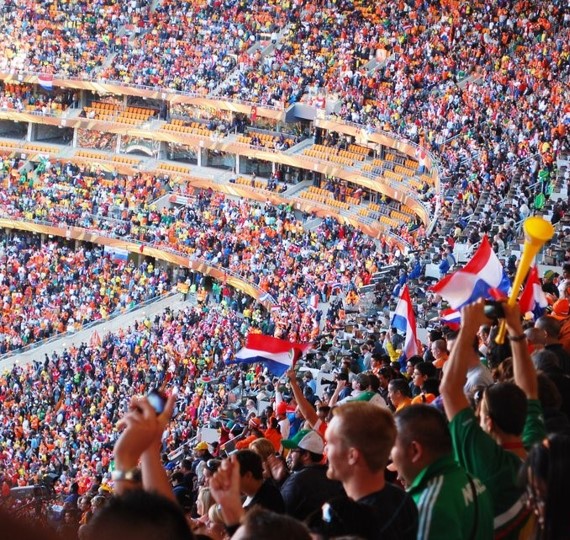Pundits claim that despite its label of being a simple sport, there’s much more to football than football itself. It starts with mental prowess – “Behind every kick of the ball there has to be a thought”, said Dennis Bergkamp, the renowned Dutch professional footballer – that continues down through the reporting and commentating by the sport’s wordsmiths. The hyperbole heard during the 2018 World Cup tournament bears witness to the good, the bad and the sublime that run through football’s DNA and most certainly through its grandiose vocabulary.
The good starts with “beautiful”. The melange of stamina and skill on display after the sport’s recent scandals gave credence to its self-proclaimed title as o jogo bonito, Portuguese for “the beautiful game”. That lofty phrase, which may have been coined by the Brazilian player Pelé, was also cited in a similar form by author H. E. Bates in his 1952 essay, “Brains in the Feet”, when he extolled the sport as “the most beautiful game in the world”, equating it to a “gladiatorial display”.
 Such a loaded scenario means that finding the right words to describe football (soccer) is no small feat. In “Writing the Beautiful Game” (The New Yorker, 19 October 2011), Giles Harvey observed: “The job of the soccer writer is thornier [than the commentator’s]. Unlike a literary critic, say, who can quote from the text under discussion, the soccer writer is profoundly alienated from his subject matter. His prose must do double-duty, at once vividly describing the game and analyzing its subtleties, the strata of activity that hovers just beneath the surface of our perception.”
Such a loaded scenario means that finding the right words to describe football (soccer) is no small feat. In “Writing the Beautiful Game” (The New Yorker, 19 October 2011), Giles Harvey observed: “The job of the soccer writer is thornier [than the commentator’s]. Unlike a literary critic, say, who can quote from the text under discussion, the soccer writer is profoundly alienated from his subject matter. His prose must do double-duty, at once vividly describing the game and analyzing its subtleties, the strata of activity that hovers just beneath the surface of our perception.”
Not that the tournament produced many surprises, but some in the media dug deeper to laud moments of creativity and individual talent. One player enjoyed “a sublime World Cup”; others made “a sublime pass”, curled in “a sublime left-foot effort”, or sent in “a sublime drive from outside the box”. “Sublime” is usually reserved to describe great excellence or beauty (as in “Mozart’s sublime piano concertos”, according to Oxforddictionaries.com) or “an overwhelming sense of awe or other high emotion through being vast or grand”. The word originated in the late 16th century, from the Latin sublimus, or sub- (“up to”) with limen (“threshold”).
But the good often comes with the bad, and the 2018 tournament was no exception. Seeing how far players can rise or fall on a 100-meter field characterizes the game that is both the opium of the masses and reminiscent of gladiator fights. Goalie gaffes were plentiful: “It’s a howler from Lloris …”, proclaimed a story on beINsports.com. A glaring blunder, and typically an amusing one under stress (such as in an exam), “howler” has been used since the 1870s, according to Oxford English Dictionary. Eric Partridge’s Dictionary of Slang and Unconventional English, first published in 1937, cited it as “literally something that howls or cries for notice”. A goalie, the last man standing to thwart the opposing team from scoring, is destined in a split second to be either the hero or the goat (and that’s not “greatest of all time”).
 The good, the bad, the sublime: they stand out because the sport is no longer truly predicable. Gary Lineker, England’s record goal scorer in FIFA World Cup finals, once wryly observed that football is “a simple game: 22 men chase a ball for 90 minutes and at the end, the Germans always win”. Yet this and other measures of predictability were summarily debunked during the tournament. Teams will continue to rely on their “jokers”, the substitute players tasked with turning a questionable outcome into clear victory with a winning goal. Like a “wild card”, the joker is “a person or factor likely to have an unpredictable effect on events”.
The good, the bad, the sublime: they stand out because the sport is no longer truly predicable. Gary Lineker, England’s record goal scorer in FIFA World Cup finals, once wryly observed that football is “a simple game: 22 men chase a ball for 90 minutes and at the end, the Germans always win”. Yet this and other measures of predictability were summarily debunked during the tournament. Teams will continue to rely on their “jokers”, the substitute players tasked with turning a questionable outcome into clear victory with a winning goal. Like a “wild card”, the joker is “a person or factor likely to have an unpredictable effect on events”.
That a joker can shift the tide of a game and that a goalie can follow a howler with a sublime save are testaments to all being grand in the beautiful game’s world of words.


Your email address will not be published. Required fields are marked *